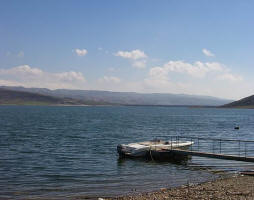 5th Horizon 2020 Steering Committee Meeting and side meetings
5th Horizon 2020 Steering Committee Meeting and side meetings
"Think piece" for the H2020 Steering Group: First reflections. This short note aims to initiate a reflection at the 2012 meeting of the Horizon 2020 Steering Group (five years after its first meeting in Marrakesh) on its modus operandi, in light of the changes that have taken place during 2011 with the Arab Spring and the implications of that change. It provides a basis for discussion by offering a set of opinions but does not pretend to be an exhaustive or comprehensive analysis. Therefore, this “think piece” is not an official document or position but the starting point for a discussion.
The process of change across the Mediterranean is not over, nor is it clear where it will end. However, reflection on what are the drivers, threats and opportunities during this turbulent period may prompt us to make changes to the way we are working where this is believed to be necessary.
What are the changes in the regional political framework?
In response to the political developments of the region, the EU has reviewed its approach and is now giving increased priority to the Mediterranean. The ENP will have a much higher level of differentiation between countries allowing each partner country to develop its links with the EU as far as its own aspirations, needs and capacities allow. The new approach is based on the 'more for more' principle under which more support will be offered to those partners that deliver on democratic and economic reforms. The new approach also gives greater priority to working with civil society than before.
In parallel, the Union for the Mediterranean (UfM) Secretariat has been established - and has been operational since the beginning of 2011 - as the technical arm of the 43 UfM countries and a new mechanism for assisting the different stakeholders (government, NGO, private sector etc.) in the identification and development of regional, sub-regional or trans-national projects, or national projects falling within agreed frameworks or initiatives, such as H2020.
In general, regional cooperation has been difficult over recent years. In many instances, the political disagreements within the UfM have been an obstacle to obtaining high level political commitment from the region as a whole, of the kind that launched Horizon 2020.
This will hopefully improve as new modalities of cooperation emerge in a changed landscape. The effects of the political blockages on working at regional level have been mitigated by continuing to work under existing political endorsements and stressing the technical nature of the H2020 projects. This makes H2020 extremely valuable and unique. So, although links to the policy level remain vital, for real change to take place, we have to make sure that proposals for revision, improvements, etc. to H2020 (albeit made with good intentions), do not complicate its operation or threaten its continuity.
--
Think Piece (En) Created 2012-03-29 Size 36.55 KB Downloads 25
Think Piece (Fr) Created 2012-03-29 Size 39.05 KB Downloads 23
3rd H2020 CB Sub Group Meeting-Agenda (Fr) Created 2012-03-29 Size 98.93 KB Downloads 22
5th H2020 Steering Group Meeting-Agenda (Fr) Created 2012-03-29 Size 86.24 KB Downloads 22
3rd H2020 CB Sub Group Meeting-Agenda (En) Created 2012-03-29 Size 97.08 KB Downloads 23
5th H2020 Steering Group Meeting-Agenda (En) Created 2012-03-29 Size 105.41 KB Downloads 23
| Contact information |
ENPI Horizon 2020 Capacity Building/Mediterranean Environment Programme
(email: vangelis@gwpmed.org) |
|---|---|
| Event type | Seminar |
| File link |
http://www.h2020.net/en/resources/meeting-documents/viewcategory/167.html |
| File link copy |
|
| Source | The Sustainable Water Integrated Management - Support Mechanism (SWIM-SM) |
| Subject(s) | AGRICULTURE , ANALYSIS AND TESTS , CHARACTERISTICAL PARAMETERS OF WATERS AND SLUDGES , DRINKING WATER , DRINKING WATER AND SANITATION : COMMON PROCESSES OF PURIFICATION AND TREATMENT , ENERGY , FINANCE-ECONOMY , HEALTH - HYGIENE - PATHOGENIC MICROORGANISM , HYDRAULICS - HYDROLOGY , INDUSTRY , INFORMATION - COMPUTER SCIENCES , INFRASTRUCTURES , MEASUREMENTS AND INSTRUMENTATION , METHTODOLOGY - STATISTICS - DECISION AID , NATURAL MEDIUM , POLICY-WATER POLICY AND WATER MANAGEMENT , PREVENTION AND NUISANCES POLLUTION , RIGHT , RISKS AND CLIMATOLOGY , SANITATION -STRICT PURIFICATION PROCESSES , SLUDGES , TOOL TERMS , TOURISM - SPORT - HOBBIES , WATER DEMAND , WATER QUALITY |
| Relation | http://www.emwis.net/thematicdirs/events/2012/04/rmr-working-group-environmental-indicators |
| Geographical coverage | Spain |
| Address | Barcelona |
| Organizer | DG EuropeAid, European Commission, the H2020 Capacity Building Sub Group , The Sustainable Water Integrated Management - Support Mechanism (SWIM-SM) & The UfM Secretariat |
| Target audience | Regional |
| Period | [18/04/2012 - 19/04/2012] |
| Status | Confirmed |
| Working language(s) | ENGLISH , FRENCH |
 you are not logged in
you are not logged in





